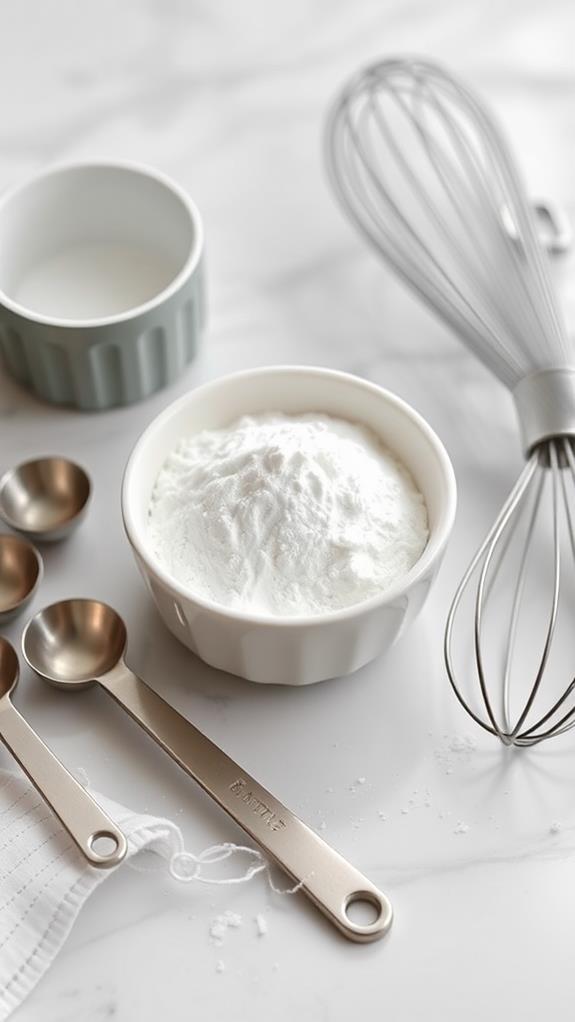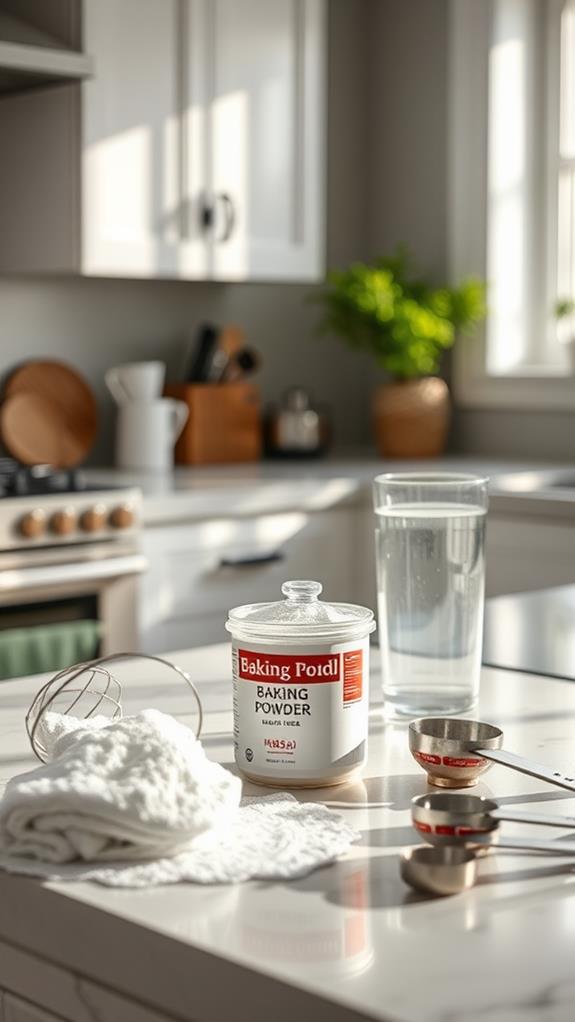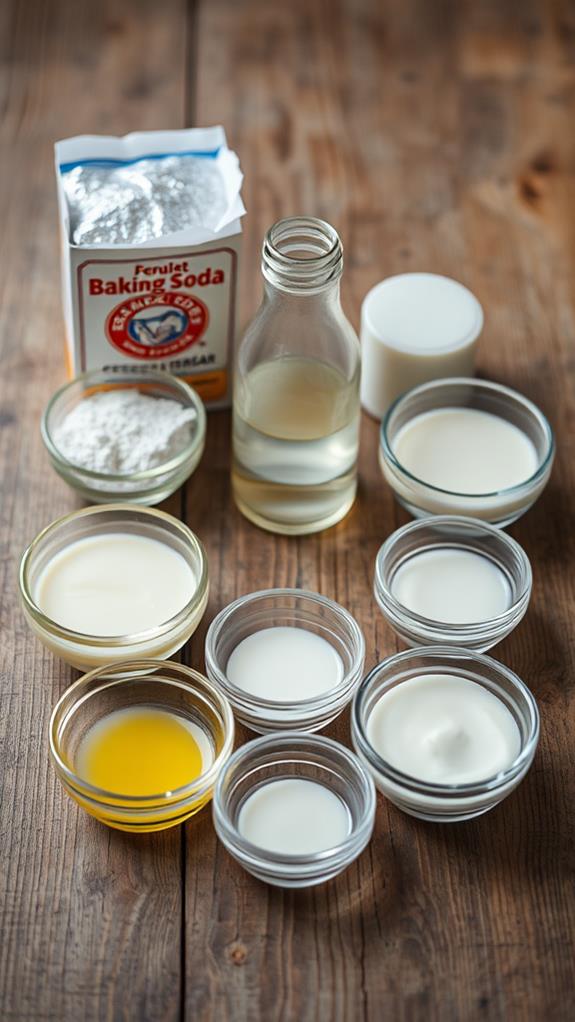Is It Safe to Eat Baking Powder
Baking powder is generally safe to consume in small amounts as part of baked goods, but eating it directly or in large quantities can be harmful. It's a leavening agent composed of sodium bicarbonate, acid, and a stabilizer. While it's essential for creating light, fluffy baked goods, consuming too much can lead to digestive issues and potential long-term health risks. You should always use baking powder as directed in recipes and avoid eating it raw. If you have specific health concerns, such as kidney problems or hypertension, consult your healthcare provider about baking powder consumption. Understanding the ingredients and proper usage of baking powder can help you make informed decisions about its safety.
This post may contain affiliate links. If you make a purchase through these links, I may earn a commission at no additional cost to you. Additionally, portions of this post may be generated using artificial intelligence (AI) technology. While we strive for accuracy, please be aware that AI-generated content may not always be perfect and should be fact-checked when necessary.
The Spatula Scoops
- Baking powder is safe to consume in small amounts typically used in baking recipes.
- Eating baking powder directly or in large quantities can cause digestive discomfort and gastrointestinal distress.
- Excessive consumption of baking powder may interfere with the body's acid-base balance due to its sodium bicarbonate content.
- Individuals with kidney problems or hypertension should be cautious about baking powder consumption due to its sodium content.
- It's advisable to use baking powder only as directed in recipes and avoid consuming it directly or in excessive amounts.
What Is Baking Powder

Understanding baking powder is key to answering the safety question. Baking powder is a leavening agent you'll find in many kitchens. It's a dry chemical mixture that creates carbon dioxide gas when it comes into contact with liquid and heat. This reaction causes baked goods to rise, giving them a light and fluffy texture. Similar to corn syrup production, baking powder undergoes a refining process to guarantee consistency and quality in its composition.
You'll typically find three main components in baking powder: a base (usually sodium bicarbonate, also known as baking soda), an acid (like cream of tartar), and a moisture-absorbing starch (often cornstarch). When you add liquid to your batter or dough, the acid and base react, producing tiny bubbles of carbon dioxide. These bubbles expand when heated, causing your baked goods to rise.
There are two types of baking powder you might encounter: single-acting and double-acting. Single-acting baking powder reacts when it comes into contact with moisture. Double-acting baking powder, which is more common, reacts twice: once when mixed with liquid and again when exposed to heat. This dual reaction gives you more reliable results in your baking.
Ingredients in Baking Powder
While we've touched on the basic components of baking powder, let's explore deeper into its specific ingredients. Baking powder typically consists of three main elements: a base (usually sodium bicarbonate), an acid (often cream of tartar), and a stabilizer (commonly cornstarch). The base and acid react when moisture is introduced, producing carbon dioxide gas that causes baked goods to rise. Unlike pure kosher salt, baking powder contains additives that serve specific purposes in baking. These additives are carefully balanced to guarantee ideal leavening action in your recipes.
You'll find that different types of baking powder may use varying acid ingredients, such as monocalcium phosphate or sodium aluminum sulfate. These acids affect the rate at which the leavening reaction occurs, influencing the texture and rise of your baked goods. Cornstarch, the stabilizer, prevents premature reactions by absorbing moisture and keeping the acid and base separate until liquid is added during baking.
Here's what you might experience when using baking powder:
- A subtle, slightly tangy flavor in your baked goods
- Improved texture and lightness in cakes and muffins
- Consistent rising action in various recipes
- Extended shelf life for your dry baking ingredients
Understanding these ingredients helps you make informed choices about the baking powder you use in your recipes, guaranteeing ideal results in your culinary endeavors.
Health Effects of Consuming

Knowing the ingredients in baking powder leads us to an important question: Is it safe to consume? While baking powder is generally safe when used as intended in cooking, consuming large amounts can have adverse health effects. You'll want to be cautious about ingesting it directly or in excessive quantities. Similar to raw rice consumption, eating baking powder in its uncooked form can lead to gastrointestinal distress and potential long-term health risks.
When you consume baking powder in small amounts through baked goods, it's typically harmless. However, eating it raw or in large doses can cause digestive issues. You might experience stomach pain, nausea, or vomiting. The sodium bicarbonate in baking powder can also interfere with your body's acid-base balance if consumed in high quantities.
For individuals with certain health conditions, such as kidney problems or hypertension, the sodium content in baking powder could be a concern. It's always best to consult with your healthcare provider if you have specific health concerns.
Safe Usage Guidelines
To guarantee safe usage of baking powder, it is critical to follow proper guidelines. Always check the expiration date on your baking powder container, as expired products may not work effectively and could potentially cause digestive issues. Store your baking powder in a cool, dry place to maintain its potency and prevent moisture from affecting its composition.
When using baking powder in recipes, measure carefully and follow the instructions precisely. Too much baking powder can result in a bitter taste and may cause stomach discomfort. It is also vital to distinguish between baking powder and baking soda, as they're not interchangeable in recipes.
Always use fresh, unexpired baking powder. Store properly in a cool, dry place. Measure accurately when baking. Don't confuse with baking soda.
If you're concerned about aluminum in some baking powders, opt for aluminum-free varieties. These are readily available and perform just as well in recipes. Remember, baking powder is meant for baking, not for direct consumption. While small amounts in baked goods are safe, ingesting large quantities of raw baking powder can lead to health issues and should be avoided.
Alternatives to Baking Powder

Considering the versatility of baking powder, you might wonder if there are suitable alternatives. Indeed, several substitutes can help you achieve similar leavening effects in your baked goods. One popular option is a mixture of baking soda and cream of tartar, which creates a reaction similar to baking powder. You'll need to use one part baking soda to two parts cream of tartar for this DIY version.
Another alternative is buttermilk or yogurt combined with baking soda. The acidity in these dairy products reacts with the baking soda, creating the necessary lift. For each teaspoon of baking powder, you can use 1/4 teaspoon baking soda and 1/2 cup buttermilk or yogurt. You'll need to reduce other liquids in your recipe to compensate.
Self-rising flour is another option, as it already contains baking powder and salt. However, you'll need to adjust your recipe accordingly. Finally, for recipes that don't require much leavening, you can use whipped egg whites to incorporate air and create volume. These alternatives provide flexibility when you're out of baking powder or prefer to avoid it.
Frequently Asked Questions
Can Baking Powder Be Used as a Teeth Whitening Agent?
While baking powder can be used as a DIY teeth whitening agent, it's not recommended by dental professionals. You might've heard about its potential to remove surface stains, but it's abrasive and can damage your tooth enamel over time. The risks outweigh the benefits. Instead, opt for safer, dentist-approved whitening methods like professional treatments or over-the-counter products designed specifically for teeth. If you're concerned about tooth discoloration, it's best to consult your dentist for personalized advice and safe whitening options.
Does Baking Powder Lose Effectiveness if Stored in the Refrigerator?
You'd think storing baking powder in the fridge would keep it fresh longer, but ironically, it's not the best idea. Your baking powder won't lose effectiveness in the refrigerator, but it might absorb moisture and odors, affecting its quality. It's best to keep it in a cool, dry place at room temperature. An airtight container in your pantry is ideal. Remember, baking powder typically lasts 6-12 months when stored properly, so check the expiration date before use.
Can Baking Powder Be Used to Treat Insect Bites or Stings?
While baking powder isn't a standard treatment for insect bites or stings, you can use it as a home remedy. Mix a paste of baking powder and water, then apply it to the affected area. It may help reduce itching and inflammation due to its alkaline nature. However, it's not a substitute for medical treatment. If you experience severe symptoms or an allergic reaction, seek professional medical help immediately. Always consult a healthcare provider for proper treatment of insect bites or stings.
Is It Possible to Make Homemade Baking Powder Without Cornstarch?
You're in luck! Like a chef crafting a secret recipe, you can whip up homemade baking powder without cornstarch. Simply mix one part baking soda with two parts cream of tartar. This dynamic duo creates the same leavening action as store-bought baking powder. If you're planning to store it, add a bit of arrowroot powder or rice flour to prevent clumping. Remember, this homemade version is more potent than commercial options, so you'll need to adjust your recipes accordingly.
Can Baking Powder Be Used as a Natural Deodorant Alternative?
You can use baking powder as a natural deodorant alternative, but it's not the most effective option. It works by absorbing moisture and neutralizing odors due to its alkaline nature. To use it, apply a small amount to clean, dry underarms. However, it may cause skin irritation for some people and won't prevent sweating. Commercial deodorants often contain additional ingredients for better odor control and skin-friendly formulations. If you're looking for natural alternatives, you might consider options like coconut oil or apple cider vinegar instead.
Conclusion
As you've explored the world of baking powder, you've uncovered its ingredients, safety, and uses. Like a chef perfecting a recipe, you now understand how to incorporate this leavening agent wisely. Remember, moderation is key. While baking powder is generally safe when used correctly, excessive consumption may lead to discomfort. If you're concerned, consider alternatives like baking soda or self-rising flour. Armed with this knowledge, you can confidently whip up delicious baked goods without worry.





